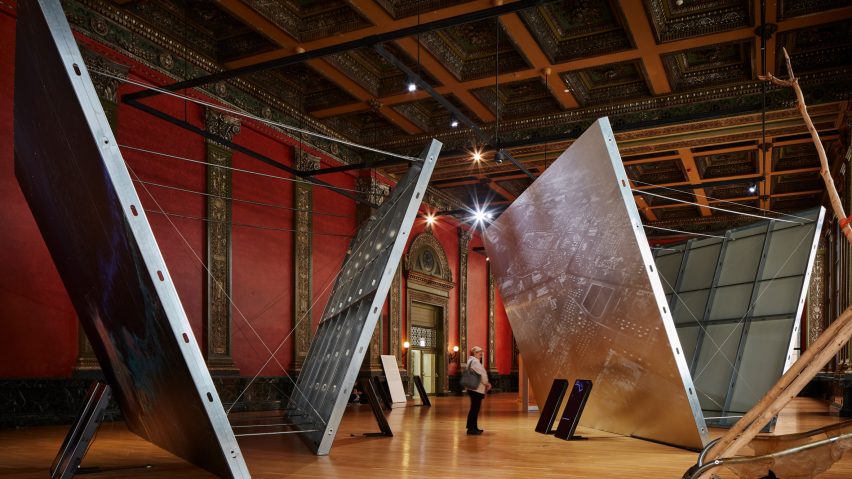
BP sponsorship "allows us to present an exhibition that is free" says Chicago Architecture Biennial
The Chicago Architecture Biennial has defended its sponsorship deals with petroleum giant BP and energy company Exelon, amid a growing backlash over arts sponsorship from companies that contribute to climate change.
The biennial's executive director Todd Palmer said that funds from BP, which is the event's founding sponsor, and Exelon Corp, its presenting sponsor, allowed it to provide free access to exhibitions.
"Energy, land-use, and our changing climate are central to some of the most significant challenges facing architecture and its practitioners today," he said in a statement to Dezeen.
"This funding enables us to present an exhibition that is free and open to the public and to support research and the creation of new work."
Climate change is one of the topics discussed at the biennale. Palmer added: "There is a clear separation between our funding and the Biennial's artistic direction."
However Palmer refused to answer questions about whether sponsorship from companies that contribute to climate change were appropriate.
Protestors accuse BP of culture-washing
Gender-equity advocacy group ArchiteXX has boycotted the event, claiming BP's involvement is an example of culture-washing.
"It is clear to us, and to others, that BP uses sponsorships in public facing, progress-oriented, events like the Chicago Architecture Biennial to position themselves as a socially responsible corporation when the reality could not be more distant," ArchiteXX said in a statement published prior to the event's opening.
"At a time when sustainability must be at the front and centre of our professional and political lives, we cannot abide architecture being used to culture-wash the image of a global oil conglomerate with a chequered record," the statement said.
"We have elected to not be listed with or otherwise officially affiliated with the 2020 Chicago Architecture Biennial due to its connection with BP," the group wrote on its website.
The biennial lists British oil and gas multinational BP and US power generator Exelon Corp first and second on the sponsors page on its website.
Arts organisations sever ties with polluting sponsors
A recent survey by The Guardian newspaper found that BP is the sixth biggest contributor to climate change out of all the companies in the world. It is responsible for 34.2 billion tonnes of carbon dioxide equivalent since 1965, according to the newspaper.
Based in Chicago, Exelon Corp is the largest regulated utility company in the USA, with 10 million customers and annual revenues of over $30 billion (£23.2 billion). It owns power plants that run on natural gas, oil as well as nuclear, solar and hydro sources, according to Wikipedia.
The biennial's defence of its funders comes as arts organisations elsewhere sever ties with polluting sponsors.
Earlier this month, London theatre RSC was pressured to end its deal with the BP after student-led protests and the resignation of associate artist Mark Rylance.
BP and the Tate museum cut their ties in 2016, following a number of protests held by environmental activists.
Defence comes in the wake of "toxic philanthropy" backlash
This comes amid a broader backlash against "toxic philanthropy" that has hit institutions including London's Design Museum and Serpentine Galleries, and New York's Whitney Museum.
In an Opinion piece for Dezeen, Forensic Architecture researcher Robert Trafford described the current model of philanthropic support as "an ongoing act of self-harm" and argued that institutions to rethink the system for supporting culture.
Forensic Architecture is also among the exhibitors in this year's biennial. Dezeen contacted the studio for comment on the event's sponsorship but did not receive a response before publishing.
The Chicago Architecture Biennial was established in 2014. The 2019 edition, called...And Other Such Stories, focuses on a wide-range of issues such as social housing, gun violence, cultural histories as well as climate change. This year's edition opened on 19 September and runs until 5 January 2020.
Read on for the full statement from Todd Palmer:
"It is the mission of the Chicago Architecture Biennial – and a key role of art and architecture biennials in general – to address critical questions regarding architecture, the built environment, and contemporary life," said Palmer's statement. "Our hope is that each edition will serve as a forum to reflect upon the issues of our time, bringing diverse perspectives into conversation with the city, the field and a broader network of partners and constituents.
"As a not-for-profit organisation, the Biennial seeks support across a number of sectors: philanthropic foundations, arts and cultural funds, private individuals and corporations. This funding enables us to present an exhibition that is free and open to the public and to support research and the creation of new work. Our goal is to promote a dialogue that addresses the intersection of architecture and the built environment. We seek to create opportunities for learning for the broad public and stakeholders who visit and engage the exhibition."
"There is a clear separation between our funding and the Biennial's artistic direction. Energy, land-use, and our changing climate are central to some of the most significant challenges facing architecture and its practitioners today. In response, the 2019 edition of the biennial addresses these topics by reflecting upon past, present and future relationships between land, nature, and society."
Featured photograph is by Kendall McCaugherty.